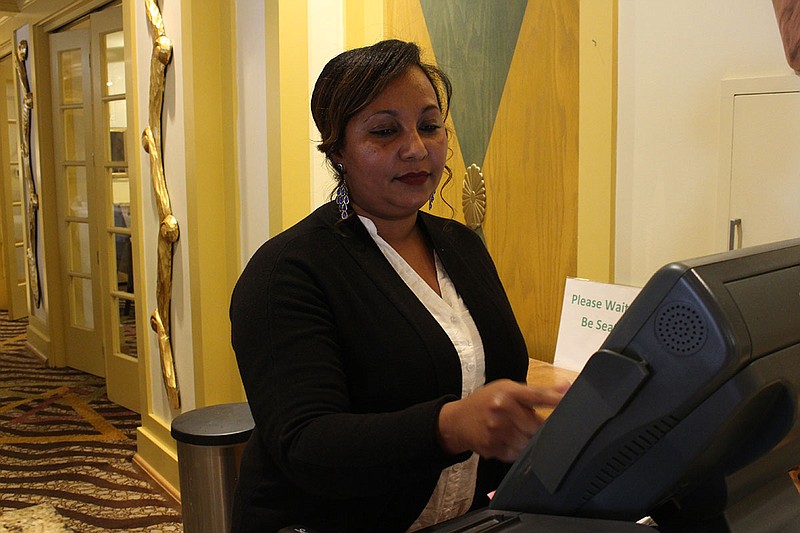Domestic violence, or Intimate Partner Violence (IPV), extends beyond immediate harm, often leading to a perilous journey towards homelessness, especially for those with limited financial resources. A recent groundbreaking study by the University of California San Francisco Benioff Homelessness and Housing Initiative sheds light on the alarming connection between domestic violence and homelessness. The study, titled “Toward Safety: Understanding Intimate Partner Violence and Homelessness,” reveals a staggering 17% of homeless individuals attribute their homelessness to escaping abusive relationships.
An Ethnic Media Services (EMS) briefing featured influential speakers who shed light on this complex issue. Dr. Anita Hargrave, Assistant Adjunct Professor at UCSF and lead researcher, shared key findings and policy recommendations from the California Statewide Study of people experiencing homelessness. Jennifer White-Reid, Chief of Staff & Senior Advisor to the CEO at Urban Resource Institute (URINYC), provided insights into the services for domestic violence victims and unhoused individuals by URINYC. Desiree (Dez) Martinez, Executive Director of We Are NOT Invisible, added a personal touch by sharing her experience of homelessness due to IPV.
Key Discoveries and Recommendations:
Dr. Hargrave’s presentation revealed critical findings, with 40% of participants reporting IPV before becoming homeless citing violence as a reason for leaving their last housing. Survivors faced economic challenges, with low incomes and partners fraudulently using their credit, making them vulnerable to homelessness.
Financial support emerged as a preventive measure, as 73% of survivors believed a monthly subsidy could have helped them avoid homelessness. Additionally, 95% identified the high cost of housing as a barrier to exiting homelessness, emphasizing the need for increased access to affordable permanent housing.
Urgent Policy Recommendations:
The briefing highlighted the urgent need for policy changes to address the intersection of domestic violence and homelessness. Key recommendations included increasing access to affordable permanent housing, bolstering homelessness and violence prevention programs, supporting current homeless survivors, and ensuring responses prioritize equity and inclusivity.
Acknowledging the Critical Link:
Speakers stressed the crucial importance of recognizing the link between domestic violence and homelessness. The UCSF study’s findings call for comprehensive policy changes to provide financial support, increase access to affordable housing, and prioritize the safety and well-being of survivors. By addressing these issues, society can work towards breaking the cycle of intimate partner violence leading to homelessness, creating a more supportive and secure environment for survivors.
Jennifer White-Reid, Chief of Staff & Senior Advisor to the CEO at Urban Resource Institute (URINYC), discussed crucial strategies to reduce domestic violence and its intricate connection to homelessness. As the largest provider of temporary housing for domestic violence survivors in the United States, URINYC plays a pivotal role in offering trauma-informed support to families facing violence and homelessness.
Overview of URINYC’s Initiatives:
Jennifer highlighted URINYC’s commitment to ending cycles of violence and homelessness through trauma-informed, client-centered support. With 23 shelters in New York City, including 15 for domestic violence survivors, URINYC provides temporary housing to over 3,000 people nightly and offers trauma-informed programming to around 40,000 people annually.
The Alarming Link Between Domestic Violence and Homelessness:
Emphasizing the intersection of domestic violence and homelessness, Jennifer pointed out that approximately 40% of women and children in New York City’s homeless family shelter system are there due to domestic violence. Recent data revealed a 29% increase in intimate partner homicides citywide between 2021 and 2022.
URINYC’s Blueprint for Change:
Jennifer shared URINYC’s comprehensive approach to addressing domestic violence and homelessness in their “Blueprint for Change” policy document. This blueprint focuses on prevention, economic stability, and housing stability.
Prevention: URINYC advocates for investing in youth violence prevention and healthy relationship education. Their relationship abuse prevention programs in schools play a vital role in breaking the cycle of abuse.
Economic Stability: Economic abuse, experienced by 98% of survivors, often traps individuals in abusive situations. URINYC’s economic empowerment program provides workforce development, employment assistance, and access to affordable housing resources.
Housing Stability: URINYC’s groundbreaking program, People and Animals Living Safely (PALS), addresses the link between domestic violence and pet ownership, recognizing the importance of pets in the healing process.
The Urgency for Community Support:
Jennifer stressed the urgency of the situation, citing the alarming increase in domestic violence homicides, especially impacting Black and Hispanic women from marginalized communities. She called for community support, emphasizing the need for the media to amplify survivors’ voices and raise awareness about organizations like URINYC.
In her powerful address, Jennifer White-Reid provided a comprehensive overview of URINYC’s efforts to combat domestic violence and homelessness. By focusing on prevention, economic stability, and housing stability, URINYC strives to create a more empathetic and supportive community that stands united against these pressing issues.
Jennifer White-Reid concluded her insightful presentation by expressing gratitude for the audience’s attention and extended an invitation for questions. Before engaging with the audience, she shared an inspiring addition—a short clip of Hope Dawson Sessons, a survivor and former URI client, featured on ABC’s Here and Now.
Hope Dawson Sessons’ Story:
Hope, along with her children and beloved dog Coco, found refuge at URI. Drawing from her personal experiences of displacement and trauma, Hope employs a trauma-informed approach to storytelling. The short clip showcased her resilience and determination to navigate through adversity towards hope and healing.
A Beacon of Empowerment:
Hope, beyond being a survivor, is a prolific writer with multiple poetry books and a forthcoming memoir. Her empowering message reaches a broader audience through her YouTube channel. Through her work, Hope aims to empower others to embrace their own paths, fostering a message of perseverance, healing, and triumph over life’s challenges.
Jennifer emphasized the transformative power of Hope’s story, highlighting the importance of sharing narratives that inspire hope and resilience. The clip served as a poignant reminder of the impact that supportive organizations like URINYC can have on the lives of survivors, enabling them to not only rebuild but also to thrive.
In closing, Jennifer White-Reid reiterated the collaborative effort needed from the community and media to amplify the voices of survivors like Hope and to raise awareness about the vital work carried out by organizations such as URINYC. The event concluded on a note of hope, resilience, and a call to action for a more empathetic and united community against domestic violence and homelessness.
Desiree (Dez) Martinez, the Executive Director of We Are NOT Invisible, took the stage to share her powerful story as a survivor of intimate partner violence (IPV) who experienced homelessness for five years. Her journey is a testament to resilience, determination, and the transformative power of advocacy.
A Desperate Search for Help:
Describing the harrowing circumstances that led to her homelessness, Dez explained that she experienced mental and emotional abuse, resulting in a mental breakdown. Seeking help at a local mental health office, she found herself confined due to perceived risk. Dez expressed her desperation for assistance and a safe haven, but unfortunately, her experience in the mental facility left her unwilling to endure further suffering.
Navigating Limited Support:
Facing financial constraints and limited support in her county, Dez reached out to national hotlines that directed her to local resources. Despite not meeting the criteria for a homeless bed at a domestic violence shelter, she ended up at a local homeless shelter, sleeping on the floor among various individuals. The gender restrictions at that time exposed her to the streets with no option for a safe shelter.
Choosing Homelessness over Abuse:
Dez’s financial constraints hindered her ability to relocate, surviving on a fixed disability income while facing steep rent prices. She made the brave choice of homelessness over returning to abuse, spending her time on the streets using her photography skills to document the realities and advocate for change.
Advocacy and Empowerment:
Engaging in local government meetings and community gatherings, Dez aimed to shed light on the challenges faced by the unhoused. Her involvement with organizations like UCSF HI provided a platform to share her experiences and advocate for those in similar situations. Today, doors of opportunity have opened for Dez, allowing her to speak and be heard, thanks to the support and education provided by UCSF HI.
Hope for Change:
While currently housed temporarily on a housing voucher for affordable housing, Dez expressed concerns about the rising rent and the inadequacy of housing vouchers. Despite the challenges, she remains hopeful that changes are being made, and more will come as long as solidarity continues with unhoused individuals.
Transformative Advocacy Efforts:
Dez has become a national advocate for universal housing, civil rights for the homeless, and an outreach and crisis intervention worker for encampments. She has established a homeless union by currently unhoused individuals, created a social media platform to showcase the perspective of the unhoused, and operates a nonprofit dedicated to supporting the homeless community.
A Plea to the Media:
In conclusion, Dez emphasized the crucial role of the media in shaping society and impacting perceptions. She called for the media’s support in raising awareness and incorporating the viewpoint of the unhoused in all homeless-related narratives. Dez’s story stands as a testament to the strength of survivors and the power of advocacy to bring about meaningful change.
In the final segment of the briefing, the speakers were asked to reflect on their learnings from their experiences, interactions, and interviews related to domestic violence and homelessness.
Dr. Hargrave emphasized the systemic failures in protecting vulnerable populations experiencing intimate partner violence. She underscored the dual impact of intimate partner violence and limited financial resources, emphasizing the need for a national strategy that includes increasing permanent housing options for survivors.
Jennifer White-Reid highlighted the importance of listening to survivors, emphasizing the value of their voices and the need for community-based solutions. She acknowledged the underreporting of domestic violence and stressed the media’s responsibility to raise awareness and advocate for solutions.
Des, drawing from her personal journey from homelessness to advocacy, shared profound insights. She discovered her own strength, the power of speaking out, and the need for continuous support for those experiencing homelessness. Des highlighted the negative and positive aspects she learned on the streets, emphasizing the importance of not feeling alone and the transformative impact of sharing personal stories.
In response to the question about headlines, the speakers provided impactful statements. Dr. Hargrave’s headline focused on the indispensable link between addressing intimate partner violence, homelessness, and the need for permanent affordable housing. Jennifer emphasized the key takeaway of listening to survivors, while Des suggested a headline that encapsulates the urgency of addressing both intimate partner violence and homelessness in unison.
The overall narrative serves as a poignant call to action, urging society to recognize the interconnectedness of domestic violence and homelessness and advocating for lasting solutions, particularly the critical need for affordable permanent housing.
#BreakTheSilence #EndDVandHomelessness #SurvivorStories #EmpowermentJourney #SafeHavenNow #DVAwareness #HomelessnessPrevention #VoicesOfResilience #BreakingChains #DomesticViolenceSurvivors #SafePaths #EmpowerAndRebuild #ChangeLives #HopeAfterDV #HomelessNoMore











